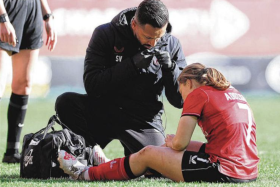Raffles Hospital to be first 'baby-friendly' private hospital here
It wants to get global certification by mid-2019
Ms Verena Lim, 30, who is expecting her first child, has concerns about breastfeeding.
But she is comforted that her worries will be alleviated at Raffles Hospital, which is aiming to attain the Baby-Friendly Hospital Initiative (BFHI) certification by mid-2019.
If successful, it will become the first private hospital in Singapore to have the certification along with three public hospitals - Singapore General Hospital, KK Women's and Children's Hospital and National University Hospital.
The certification is a global initiative for hospitals to implement practices to protect, promote and support breastfeeding, said the Health Promotion Board.
At her first antenatal consultation session yesterday, Ms Lim, an internal audit executive, said: "I feel it is ideal to exclusively breastfeed the baby. But I also worry that I won't be able to produce enough milk.
"I find it helpful that the hospital provides support and even a 24-hour hotline to call."
Under the certification, healthcare workers have to educate parents on breastfeeding and show mothers how to breastfeed and maintain lactation.
They also help mothers maintain skin-to-skin contact with their babies immediately after birth for at least an hour.
They should also help parents to practise "rooming-in" - where mother and infant remain together for 24 hours.
There were 639 births at the hospital last year.
It started training more than 80 maternity nurses this month, which involves 17 hours of breastfeeding e-learning modules and three hours of clinical teaching sessions.
ENCOURAGE
To encourage breastfeeding, formula milk and feeding bottles will not be displayed at its retail pharmacy. Formula will be used only when babies are medically unable to breastfeed.
Senior Minister of State for Health Amy Khor, who was at a media tour of the hospital's maternity ward yesterday, hoped other private hospitals will also work towards the BFHI certification.
She noted a 50 per cent rise in the number of mothers breastfeeding exclusively after the three public hospitals attained the certification from 2013.
Dr Khor said there are challenges, such as parents who resist the 24-hour rooming-in as they worry about not getting enough rest after giving birth.
She said rooming-in calms the baby, and the mother will grow more confident in responding to the baby's needs and cues.
Senior lactation consultant Helen Espina Cruz, who recently helped a mother with rooming-in and skin-to-skin contact, said it was a good experience for all.
"The baby was quiet, and the mother said it was a happy feeling. Support is also important to help the mother rest because she can be exhausted after delivery."
Get The New Paper on your phone with the free TNP app. Download from the Apple App Store or Google Play Store now


